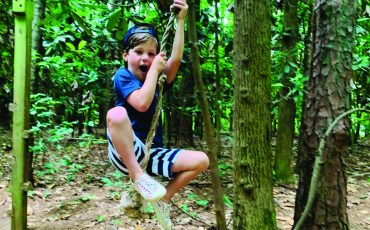Signs Your Child Struggles with Seasonal Allergies
 Around the same time that the dogwoods bloom, the chorus of “achoo!” starts to ring out, too. Learn how to spot seasonal allergies in children and hear from the experts on the best ways to treat symptoms (or avoid them altogether).
Around the same time that the dogwoods bloom, the chorus of “achoo!” starts to ring out, too. Learn how to spot seasonal allergies in children and hear from the experts on the best ways to treat symptoms (or avoid them altogether).
by Sarah Cook McBride
Seasonal allergies can be frustrating for all ages, perhaps especially young children, who can only let us know through a runny nose or red eyes that they aren’t coping well with the changing seasons. More formally known as “allergic rhinitis,” hay fever or allergies, rears its ugly head when our bodies overreact to allergens that are usually a harmless substance (such as pollen, dust or pet dander).
Thanks to warmer winters that allow plant life to bloom as early as February, Georgia – sometimes referred to as “the pollen belt” along with the rest of the southeast region – is known for high pollen counts, leading to more itchy eyes, runny noses and all of those pesky seasonal allergy symptoms.
Dr. Lily G. Hwang, MD, an allergist with Atlanta Allergy & Asthma, is an expert when it comes to recognizing persistent symptoms related to seasonal allergies in children.
“Frequent rubbing of their nose, known as the ‘allergic salute,’ sniffling or wrinkling their nose (rabbit nose), pulling on their ears and clearing their throat, are all common symptoms in children who may have seasonal allergies,” Hwang says. “They may also develop sleep issues, mouth breathing due to nasal congestion and dark circles under the eyes, referred to as ‘allergic shiners.’”
To avoid the aforementioned salute, rabbit nose and shiner, Hwang often recommends patients begin treating seasonal allergy symptoms before the pollen count begins to rise, which can be as early as mid to late February in the Southeast. But if children are already experiencing symptoms, Hwang says there are plenty of over-the-counter medications that can help keep the sneezing and sniffling at bay. These include oral antihistamines like Zyrtec, Claritin and Allegra (or their generic counterparts). Anti-inflammatory steroid nasal sprays are also effective, she says. These might include Rhinocort, Nasacort or Flonase. Saline nasal sprays can alleviate some discomfort, too.
Dr. Tricia Lee, MD, pediatric allergist and immunologist at Children’s Healthcare of Atlanta and assistant professor of pediatrics at Emory University School of Medicine, says while there’s not “a significant amount of data to support that it’s going to improve symptoms more than taking medications,” alternative therapies include acupuncture or even integrating cinnamon bark extract into the diet.
Other natural alternatives like using warm compresses to relieve sinus pressure, cold compresses for itchy eyes, breathing in humidified air to help clear nasal passageways, drinking more water, and getting extra rest can help alleviate allergy symptoms. Simply removing rugs and curtains (which can trap allergens) and keeping windows closed can help, too.
If over-the-counter medication doesn’t help, Lee says, the next step is to seek out professional help from your child’s pediatrician or a specialized allergist. Specifically, Lee recommends testing a child through skin testing or blood work to see which allergens are causing symptoms.
“Ultimately, getting tested is of interest because that will solidify what (the child) is actually allergic to so we can predict when we need to do medications instead of acting retroactively,” Lee says. Seasonal allergies usually require one season of exposure for the immune system to develop an allergy, Hwang notes. So babies may not develop allergies until 12 to 15 months depending on the time of year they were born. Also, allergies tend to run in families.
Both physicians emphasized the importance of alleviating seasonal allergy symptoms in children because, well, kids need to be kids. And when they’re too irritated by a runny nose or itchy eyes to focus in school or enjoy the outdoors, then seasonal allergies really become a problem that need to be addressed.
“Children with allergic rhinitis have increased risk of ear infections, colds and more sleep disturbances than children without allergies,” Hwang says. “Oftentimes, children are treated for each occurrence and the underlying allergies are overlooked.”
With early diagnosis and treatment by a board-certified allergist, a plan can be put in place to help improve the overall health and quality of life of the child, Hwang says. This translates into less school absences, a shorter trail of tissues and an overall happier child whose ready to welcome the season of longer days and sunshine.
Debunking the myths
I should serve up some honey.
Local honey is often credited as a delicious way to combat seasonal allergies, but does it actually work? Compared with over-the-counter medication and prescribed medicines, honey shouldn’t be the go-to solution, both doctors say. “Local honey can help soothe cough and throat discomfort due to its humectant property, but clinical studies have not shown it to alleviate seasonal allergies,” Hwang says. This is because bees collect flower pollen, no tree, grass or weed pollen, which causes symptoms.
My child will just grow out of it.
You may have also heard a wise old parent tell you “your kid will simply grow out of it,” when it comes to seasonal allergies. This, according to the experts, is also not entirely true. “Most children with allergic rhinitis will not outgrow symptoms on their own unless they are treated with allergy immunotherapy,” Hwang says. “The symptoms may come and go depending on their specific allergic triggers and the seasonal changes throughout the year.”
There’s no pollen at the beach.
While it’s true that breathing in that wonderful ocean air can help relieve seasonal allergy symptoms, pollen is still present at the beach, so don’t leave the nasal spray at home. Also, physicians warn against other allergies that may flare up at the seashore like extra sun exposure (always, always pack the SPF), “swimmer’s itch” and barbecue smoke, which can actually harbor more allergy triggers that may be swimming in the air.
Allergies can’t happen in the winter.
You may get a break from seasonal allergies if you choose to be a snowbird and travel north, but if you plan on staying put in the south year-round, then you can count on seasonal allergies sticking around, too. Wherever there are warmer winters, there are higher pollen counts (since plants don’t die or go dormant). This results in airborne allergens making a year-round appearance.
Could it be COVID?
As long as children aren’t experiencing fever, body aches, loss of smell, nausea and vomiting, COVID-19 can usually be ruled out, Hwang says. However, as new variants emerge, both doctors encourage patients to identify their specific allergy triggers and monitor the daily pollen counts (found at atlantaallergy.com/pollen_counts) to help clarify what might be causing the symptoms that overlap. “Allergies tend to be much more ‘itchy,’” Lee says. “I don’t expect to see those symptoms as commonly with COVID as I do with allergies.”
Which months trigger which allergies?
- February through May: tree pollen
- May through late summer: grass pollen
- August through first freeze: ragweed
- Year-round: dust, pet dander, mold







